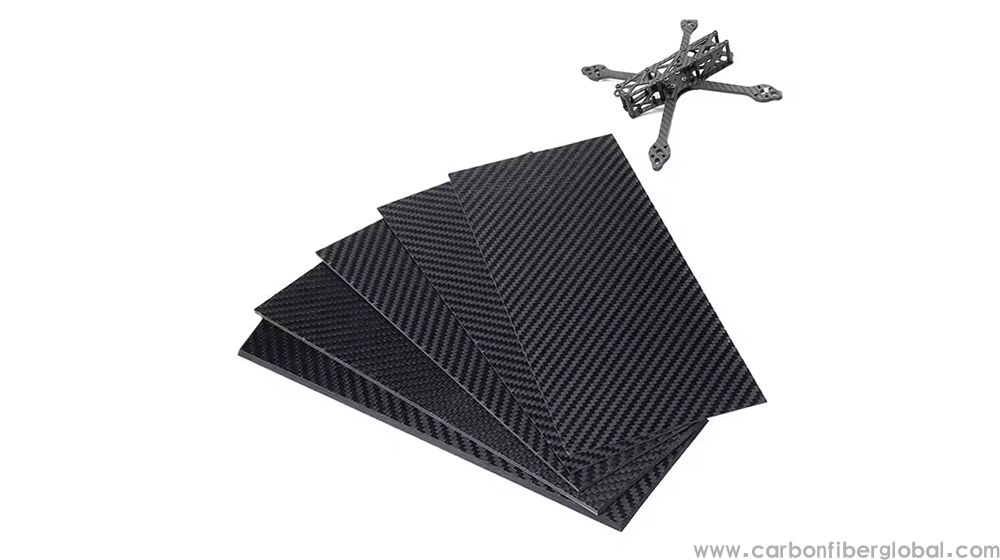Carbon Fiber Sheets: The Future of Custom Drone Design
The drone industry has seen remarkable advancements in recent years, revolutionizing sectors such as aerospace, agriculture, logistics, and surveillance. As the demand for more sophisticated and high-performing drones increases, the materials used in drone construction play a pivotal role in determining their success. One such material that is at the forefront of drone design is carbon fiber sheets. Renowned for their strength, lightweight properties, and customizability, carbon fiber sheets are quickly becoming the go-to choice for manufacturers looking to push the boundaries of drone technology.
In this article, we explore how carbon fiber sheets are shaping the future of custom drone design and why they’re considered the ultimate solution for building next-gen UAVs (Unmanned Aerial Vehicles).

1. Unmatched Strength-to-Weight Ratio for Maximum Performance
One of the key challenges in drone design is balancing strength and weight. Drones need to be lightweight enough to fly efficiently while being strong enough to withstand impacts, adverse weather conditions, and the rigors of flight. Carbon fiber sheets offer an ideal solution due to their exceptional strength-to-weight ratio.
Unlike metals such as aluminum or steel, carbon fiber is much lighter, which significantly enhances a drone's flight time and battery efficiency. At the same time, carbon fiber is incredibly strong, providing the necessary durability to handle rough landings and extended operational hours. This strength makes carbon fiber an ideal choice for both military UAVs and commercial drones.
2. Customizable Design for Specialized Drone Needs
Carbon fiber’s flexibility in design allows for customization tailored to specific drone requirements. From the thickness of the carbon fiber sheets to the weave patterns and layering techniques used, carbon fiber can be adapted for various UAV applications, such as:
- Racing drones: These require extremely lightweight frames with high impact resistance to withstand collisions while maintaining agility and speed.
- Surveillance drones: These drones need a sturdy, rigid frame capable of carrying cameras and sensors while maintaining stability during flight.
- Agricultural drones: These need a combination of strength and lightness to carry larger payloads (such as seed or pesticide) while still being able to operate efficiently for long periods.
With carbon fiber, manufacturers can create frames that meet specific performance needs, offering a level of customization that isn’t possible with traditional materials.
3. Durability in Extreme Conditions
For drones used in commercial and industrial applications, durability is crucial. Carbon fiber’s resistance to fatigue, corrosion, and weather conditions makes it the ideal material for drones that will be used in harsh environments. Whether a drone is performing a surveying mission in rugged terrain or monitoring crops in wet weather, carbon fiber sheets ensure the frame will withstand the rigors of outdoor use.
- Corrosion resistance: Carbon fiber is not susceptible to rust or corrosion like metals, making it perfect for drones that operate in humid or salty environments.
- Impact resistance: Carbon fiber can absorb shock from crashes or hard landings without cracking, extending the lifespan of the drone.
These durability features allow drones to continue operating in diverse conditions, reducing the need for frequent repairs and increasing overall operational uptime.
4. Enhanced Aerodynamics for Improved Flight Efficiency
Drones are often used for precision tasks that require a high degree of aerodynamic performance. By incorporating carbon fiber sheets into the design, manufacturers can significantly improve the aerodynamics of their drones. Carbon fiber’s rigid structure helps reduce drag, resulting in improved flight speed, stability, and efficiency.
- Less drag means longer battery life as the drone consumes less energy during flight.
- Optimized aerodynamics translates to improved maneuverability, especially in racing drones or drones used for aerial photography, where quick movements and sharp turns are required.
The ability to tailor carbon fiber frames to achieve the perfect aerodynamic profile is a game changer for drone designers who need to balance speed, efficiency, and stability.
5. Flexibility for New Drone Technologies
As drone technologies evolve, the materials used to build these machines need to keep pace. Carbon fiber sheets provide the flexibility and adaptability needed for the development of next-gen drones. For example, as drone technologies such as autonomous flight, electric propulsion systems, and advanced sensor integration become more prevalent, carbon fiber sheets offer the ideal material for accommodating these innovations.
- Advanced sensor integration: Carbon fiber’s electrical conductivity can be customized to fit the needs of drones carrying advanced sensors and communication equipment.
- Battery efficiency: The lightweight nature of carbon fiber allows drones to carry larger, more energy-dense batteries without sacrificing performance.
By using carbon fiber in the construction of autonomous UAVs or electric drones, manufacturers can build more efficient and technologically advanced machines capable of handling cutting-edge applications.
6. Reduced Maintenance Costs
Due to their durability and impact resistance, drones built with carbon fiber sheets experience less wear and tear compared to those made with traditional materials. This reduced wear leads to lower maintenance costs and fewer repairs, making carbon fiber a cost-effective choice in the long run.
Additionally, carbon fiber’s resistance to fatigue means that it maintains its structural integrity over time, even after multiple flights. This reduces the need for frequent inspections or part replacements, which can be costly and time-consuming for commercial drone operators.
7. Sustainability and Eco-Friendliness
Sustainability is becoming an increasing concern for the drone industry, especially as drones are used in environmental monitoring, agriculture, and other eco-conscious applications. Carbon fiber sheets offer a more sustainable alternative to other materials like metals or plastics, which are often more resource-intensive and harmful to the environment.
Although carbon fiber production does involve a higher initial energy cost, the long lifespan and durability of carbon fiber-based drones ensure that they produce less waste over time. Furthermore, recycling programs for carbon fiber are evolving, which makes the material even more environmentally friendly.
Carbon Fiber Global: Leading the Way in Custom Drone Design
At Carbon Fiber Global, we understand the critical role that carbon fiber sheets play in shaping the future of custom drone design. Our expertise and advanced manufacturing capabilities allow us to provide tailored carbon fiber solutions that meet the specific requirements of drone designers and manufacturers worldwide.
We offer a wide range of carbon fiber products, from standard sheets to customized solutions for specialized drone applications. Our products are designed to offer the perfect balance of strength, lightness, and durability, ensuring that your drones can achieve peak performance in any environment.
Conclusion: The Future of Drone Innovation
As drones continue to evolve, carbon fiber sheets will play an essential role in advancing drone design and performance. Whether it’s for military UAVs, commercial drones, or racing drones, carbon fiber’s unique properties make it the material of choice for the future of drone technology.
With customizable carbon fiber solutions from Carbon Fiber Global, your drones can achieve the perfect balance of strength, lightness, durability, and aerodynamics. Embrace the future of drone design with carbon fiber sheets and take your UAVs to the next level of performance.
Visit our website: www.carbonfiberglobal.com
Email us: info@carbonfiberglobal.com
文章来源用户投稿,转载请注明出处:/zmt/28821.html

